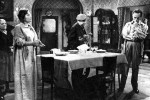MAMT||Museo Mediterraneo dell' Arte, della Musica e delle Tradizioni (EN)
|
01 January 2021
Iniziative (EN) -
MAMT – Mediterranean Museum of Art, Music and Traditions
 Great influx of links and contacts on the multimedia platform of the Museum of Peace - MAMT for the centenary of the birth of Regina Bianchi.
Great influx of links and contacts on the multimedia platform of the Museum of Peace - MAMT for the centenary of the birth of Regina Bianchi.
In the interval between the first and the second show of the theatrical company of father Raffaele and mother Maria, in a dressing room of a Lecce theater, on January 1st 1921 Regina Bianchi was born, probably the Filumena Marturano par excellence of the Edwardian theater together with the cinematographic Sophia Loren. She is the daughter of art, indeed of the stage, on which she climbs only eight days old, in the role of a ... baby girl. A circumstance that then she will make her say: «at all ages, I have always worked». Many years later she told Fiamma Satta herself how things went: she had been put to sleep in a trunk, emptied of costumes and transformed into a comfortable and safe cradle. That day the property master forgot to procure a puppet that would serve as a baby on stage. And so Regina's father had the idea of using her little girl.
Until the age of 16 Regina worked in the company of Italo Bianchi, her father's stage name, with his surname, D'Antigny, then she understood that "that was not a form of theater that could give me a track, a framework, for another type of theater that I, on the other hand, intended to do ». And so, she leaves the paternal company. After having worked for a year in the company of Mimì Maggio, Dante's father, Rosa, Virgilio and Pupella, the enterprising Regina in the summer of 1938 shows up at Raffaele Viviani's house "with braids and rolled up white socks" and asks to join the company. Satisfied, she receives her first open stage applause, in the only scene performed; Viviani himself, with an affectionate gesture, brings her back to the audience for this first ovation. In 1940 Italo Bianchi receives a phone call from Eduardo De Filippo: "I need you to send me Regina". The young actress then began to work for the De Filippo, but they were difficult years, divided as she is between the stage and the two girls born from the relationship with her partner, the director Goffredo Alessandrini, former husband of Anna Magnani, met in 1939 in occasion of his first film: The glass bridge.
Regina enters and leaves the company, until, during rehearsals at the Diana theater in 1944, the terrible quarrel between the two De Filippo brothers breaks out, which will lead to the fracture of their relations for many years. The actress, witness of the quarrel, following the division of the theater company, thanks to her family commitments, returns to Rome with Peppino's company. She stayed there until 1945, then she left the theater to be able to raise her daughters. 14 years pass, the call of the stage is strong and she Regina returns to work with Eduardo's company again, starting again in the summer of 1959 with participation in a radio edition of the drama Pain under lock and key. From the following season Regina becomes the prima donna, effectively replacing Titina (now retired due to health problems that will lead to her death in 1963), in all the leading roles of Eduardo's theater. Until the superb interpretation of Filumena Marturano, for which he received the imprimatur of the great Titina, through a beautiful letter: "I know that a word from me can do you good, and I don't hesitate to say it ... I know that you are worried about the character of Filumena that Eduardo intends to assign to you. Do not worry, my friend: if Eduardo had not had faith in your possibilities, he would not have exposed you to failure! Study the part well, listen religiously to Eduardo, and you will see that after the effort there is success! An affectionate kiss Titina ».
Regina listens religiously to Eduardo, follows his silences, cries and laughs with fantastic times. And the success is amazing: thanks also to the TV transposition, Filumena for all is now Regina Bianchi. She remained in Eduardo's company for seven years, until 1966. And these were the years of the great tours abroad, including the memorable one in Russia. Also unforgettable is the interpretation in Tell him always yes of Teresa, the sister of the protagonist Michele: no less crazy than her brother, full of manias (she shakes non-existent crumbs from her clothes and calls the waitress with a voice with the metallic tone of an old gramophone), but " perfectly ”normal and integrated into society as much as he is.
Since 1968 Eduardo has been writing Pupella Maggio, Regina begins to work with other directors and tackles the theater in Italian, accompanied by high-profile interpreters, bringing very different but all equally important theatrical texts to success. Roberto Guicciardini, Luca Ronconi, Orazio Costa, Giorgio Prosperi, Bruno Cirino, Mariano Rigillo, Lamberto Pugelli, Ugo Gregoretti, Luigi Squarzina, Franco Zefirelli, Mario Monicelli, Maurizio Scaparro, are among the directors who have chosen her to set up the works of important authors, from Goldoni to Brecht, from Garcia Lorca to Pirandello. And we cannot forget her film career, not on the sidelines but to complete her life on stage, after the first films shot at a very young age. In 1961 she A day from the lions by Nanni Loy and The Last Judgment by Vittorio De Sica; in 1962 The four days of Naples again with Nanni Loy, The counted days by Elio Petri and A Milanese story by Eriprando Visconti; in 1966 she shoots loud, louder… Non understand by Eduardo De Filippo, taken from The voices of the inside; in 1982 Neapolitan Stangata by Vittorio Caprioli; in 1984 Kaos by the Taviani brothers; in 1993 The Child Judge by Alexander of Robilant and The Teddy Bear by Jacques Derain; in 1995 Camerieri by Leone Pompucci and Les allumettes suedoises by Jacques Artaud; in 2008 There is a Frenchman, an Englishman and a Neapolitan by Edoardo Tartaglia. A glorious career crowned by two Silver Ribbons: in 1963 for The Four Days of Naples and in 1996 for Waiters.
But we cannot also forget, in the 1980s-1990s, the interpretations of her in the film reductions of some screenplays such as Zappatore, Carcerato, Betrayal, Oath all directed by Alfonso Brescia. On TV, in addition to Edwardian productions, you participate in some dramas; in 1977 she is Anna, the mother of the Virgin Mary in the Jesus of Nazareth by Franco Zeffirelli and she is the countess Agnese Ristori, Fabrizio's mother, in Elisa di Rivombrosa (2003). In 1996, for her artistic merits, Regina Bianchi was awarded the title of Grand Officer of the Republic. She died in Rome, aged 92, on 5 April 2013











